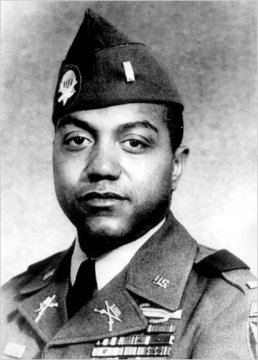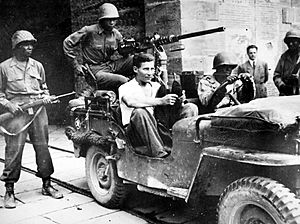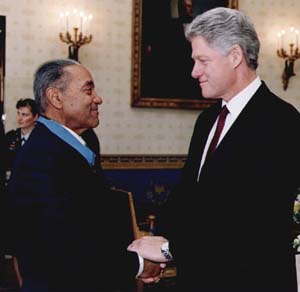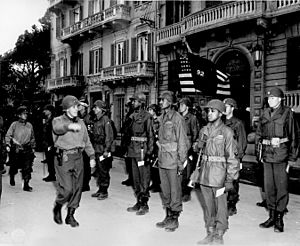Vernon Baker facts for kids
Quick facts for kids
Vernon Joseph Baker
|
|
|---|---|

Vernon Baker, received the Medal of Honor in 1997
|
|
| Born | December 17, 1919 Cheyenne, Wyoming, US |
| Died | July 13, 2010 (aged 90) St. Maries, Idaho, US |
| Place of burial | |
| Allegiance | |
| Service/ |
|
| Years of service | 1941–1968 |
| Rank | |
| Unit | C Company, 1st Battalion, 370th Infantry Regiment, 92nd Infantry Division |
| Battles/wars | World War II
|
| Awards | |
Vernon Joseph Baker (December 17, 1919 – July 13, 2010) was a brave United States Army officer. He served as a platoon leader during World War II and later as a paratrooper in the Korean War. In 1997, he received the Medal of Honor. This is the highest military award for bravery in the United States. He earned it for his heroic actions in Italy on April 5–6, 1945.
Vernon Baker and six other Black American soldiers from World War II were given the Medal of Honor on January 12, 1997. The next day, President Bill Clinton presented the awards at the White House. Baker was the only one still alive to receive his medal in person. These seven men were the first Black Americans to get the Medal of Honor for their service in World War II. Baker passed away in 2010 at age 90 and was buried at Arlington National Cemetery.
Contents
Life of a Hero: Vernon Baker
Early Years and Family Life
Vernon Baker was born on December 17, 1919, in Cheyenne, Wyoming. He was the youngest of three children. When he was four, his parents died in a car accident. He and his two sisters were then raised by their grandparents. His grandfather, Joseph S. Baker, worked on the railroad. He taught Vernon how to hunt to help feed the family. His grandfather was a very important person in Vernon's life.
Vernon's relationship with his grandmother was difficult. For a few years, he lived at the Boys Town orphanage in Nebraska. This was a place that helped children in need. In 1939, Vernon graduated from Clarinda High School in Clarinda, Iowa. He worked as a railroad porter, a job he did not like. After his grandfather died in 1939, Vernon took on several small jobs.
Joining the U.S. Army
Vernon Baker joined the U.S. Army in June 1941. He first tried to join in April, but was turned away. A recruiter told him they didn't have "quotas for you people," meaning they weren't accepting Black soldiers at that time. Weeks later, he tried again with a different recruiter and was accepted. He wanted to work in supplies, but was instead assigned to the infantry. This meant he would be a foot soldier.
After basic training in Texas, he joined the 370th Infantry Regiment, part of the 92nd Infantry Division. He went to Officer Candidate School and became a second lieutenant in 1943. In June 1944, his unit arrived in Naples, Italy. Soon after, Baker was hurt in the arm and spent two months in the hospital.
Brave Actions in World War II
In the spring of 1945, Lieutenant Baker was leading a group of soldiers called a Weapons Platoon. On April 5, his unit was ordered to attack a German stronghold on a mountain. During this attack, Baker bravely fought the enemy. He personally destroyed three enemy machine guns, an observation post, and a hidden dugout. Sadly, 19 of the 25 men in his platoon were killed.
On the second day of the attack, Baker volunteered to lead another advance. This helped his battalion secure the mountain. For his amazing bravery on April 5–6, he was first given the Distinguished Service Cross on June 10. After World War II, he became an Army parachutist. He also served in the Korean War. He retired from the Army in 1968.
Receiving the Medal of Honor
In the early 1990s, it was discovered that Black soldiers in World War II might not have been considered for the Medal of Honor because of their race. In 1993, the U.S. Army asked Shaw University to investigate this. The study found that there was indeed racial discrimination in how awards were given during World War II.
After a detailed review, the study suggested in 1996 that ten Black Americans should receive the Medal of Honor. Congress then passed a law allowing President Bill Clinton to give these awards. Seven of the ten soldiers, including Vernon Baker, were approved. On January 12, 1997, their Distinguished Service Crosses were upgraded to the Medal of Honor. The next day, President Clinton presented the Medal of Honor to Baker, who was 77 years old. He also presented the medals to the families of the other six Black Americans who had passed away.
Life After the Military
After his military career, Vernon Baker worked for the American Red Cross for nearly 20 years. He was married three times. His third wife was Fern Brown, and they had three children. After Fern's death in 1986, Baker moved to a quiet cabin in northern Idaho. He loved hunting elk there.
In 1989, he met Heidy Pawlik, a German woman visiting the U.S., and they later married. Vernon Baker passed away at his home in St. Maries, Idaho, on July 13, 2010. He had been battling cancer for a long time. His funeral was held at Arlington National Cemetery in September 2010. Three other Medal of Honor recipients and his family attended. Local community members helped raise money for his family to travel to the ceremony.
Military Awards and Honors
Vernon Baker received many awards for his service:
 |
||
 |
||
| Badge | Combat Infantryman Badge | |||||||||||
|---|---|---|---|---|---|---|---|---|---|---|---|---|
| 1st row | Medal of Honor (upgraded from the Distinguished Service Cross) | Silver Star | Bronze Star Medal with "V" device and 1 Oak leaf cluster | |||||||||
| 2nd row | Purple Heart with 1 Oak leaf cluster | American Defense Service Medal | American Campaign Medal | |||||||||
| 3rd row | European-African-Middle Eastern Campaign Medal with 3 Campaign stars | World War II Victory Medal | Army of Occupation Medal | |||||||||
| 4th row | National Defense Service Medal with 1 Service star | Croce Al Valor Militare (Italian War Cross) | Polish Cross of Valor | |||||||||
| Badge | Parachutist Badge | |||||||||||
Other Recognitions
On September 11, 2008, Vernon Baker received the Sandor Teszler Award for Moral Courage and Service to Humankind. This award was given by Wofford College in Spartanburg, South Carolina. He also received an honorary doctorate degree from the college.
In 2006, three blocks of Main Street in Clarinda, Iowa, were named "Vernon J. Baker Medal of Honor Main Street" in his honor.
See also
 | William M. Jackson |
 | Juan E. Gilbert |
 | Neil deGrasse Tyson |




